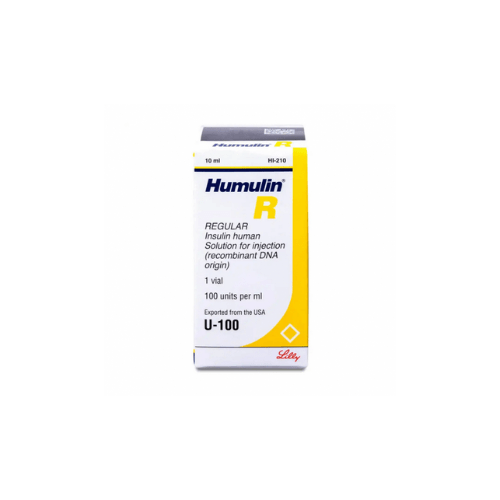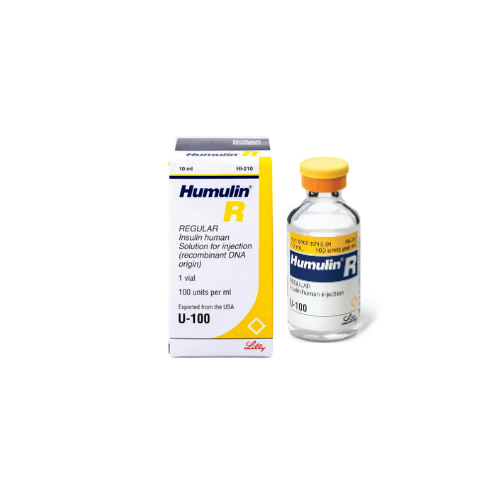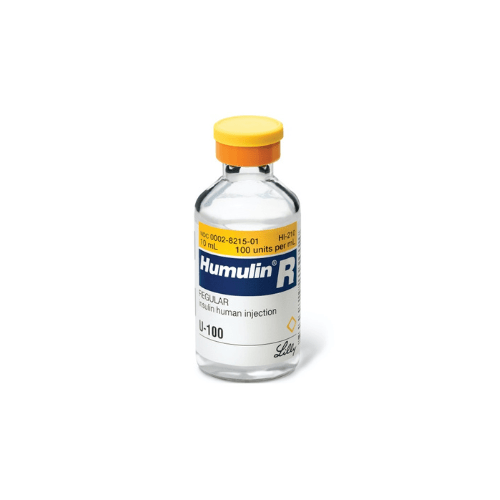Please note: a valid prescription is required for all prescription medication.
Humulin R® Vial for Diabetes
Get $50 off all orders over $200. Valid on all medications. Use code GET50 at checkout. Offer valid until March 1st.
Coupon code cannot be combined with other offers. Maximum allowable quantity equal to a 90 day supply per single order.Campaign valid for all products, except Mounjaro Vial.
$81.99
Secure Encrypted Payments
This medicine is a short-acting human insulin used to manage blood sugar. Humulin R® is given before meals to help cover prandial glucose rises. You can access US delivery from Canada through our platform, and view options even if you plan to pay without insurance.
Border Free Health connects U.S. patients with licensed Canadian partner pharmacies; prescriptions are verified with prescribers before dispensing.
What Humulin R Is and How It Works
Humulin R is regular human insulin. It helps move glucose from the bloodstream into muscle and fat and reduces liver glucose output. This Short Acting Insulin generally starts working shortly after injection, with activity that tapers over several hours. Timing varies by dose, site, and your meal pattern. A regular insulin vial is often paired with longer-acting basal therapy for full-day coverage.
This treatment can be injected subcutaneously and, in clinical settings, may be given by intravenous infusion under professional supervision. Check the official label for directions on mixing with intermediate-acting insulin and on administration routes.
Who It’s For
This therapy is indicated to improve glycemic control in adults and children with diabetes mellitus. It can be used in type 1 diabetes and as an add-on in type 2 diabetes when mealtime insulin is needed. Learn more about indications in our overview of Type 1 Diabetes.
People with repeated severe hypoglycemia or hypersensitivity to insulin excipients should avoid use unless a clinician determines it is appropriate. Always review your history of allergic reactions and your current regimen before starting an Insulin R vial.
Dosage and Usage
Dose is individualized. Many patients inject within a short window before eating to cover carbohydrates in the upcoming meal. Your prescriber may adjust based on meals, activity, and self-monitoring results. Follow your prescribed schedule and carb ratio or sliding scale if one is provided.
General use points:
- Subcutaneous sites: abdomen, thigh, upper arm, or buttocks with site rotation.
- Check glucose before dosing, especially if meals are delayed or intake is uncertain.
- Do not share vials or syringes. Use a new sterile needle for each injection.
- When instructed to mix with NPH, draw up regular insulin first and inject promptly.
- In hospitals, IV use may occur under direct supervision and protocols.
An Insulin regular 10 mL vial is measured with U-100 insulin syringes unless your clinician and pharmacy specify a different presentation.
Strengths and Forms
Common presentations include multi-dose vials intended for use with appropriate syringes. Availability can vary by pharmacy and region. Many patients use a U-100 format; a higher-concentration 20 mL option exists in some markets. Your prescriber will specify the correct presentation on your prescription.
Missed Dose and Timing
If you miss a mealtime dose, check your blood glucose and consider when you will eat next. Do not inject two doses close together. Skipping or duplicating doses can increase the risk of hypoglycemia or hyperglycemia. If you are unsure what to do, contact your healthcare professional or follow your clinic’s written action plan.
Storage and Travel Basics
Keep unopened vials refrigerated and protected from freezing. Once in use, many labels allow room temperature storage for a limited period; confirm the specific timeframe on the package insert. Avoid excessive heat and direct sunlight, and never use insulin that has been frozen or looks cloudy, thickened, or discolored if the product is supposed to be clear.
For travel, carry supplies in an insulated case and keep them with you rather than in checked baggage. Bring extra syringes and a copy of your prescription for security checks. Temperature-controlled handling when required supports product integrity in transit. See our educational guide on Insulin Types for context on storage practices across the class.
Benefits
Short-acting human insulin may help reduce mealtime glucose spikes when used as directed. It can be coordinated with basal insulin and carbohydrate intake, which may streamline your routine. Clear dosing instructions and repeatable absorption profiles can support consistent day-to-day management.
Side Effects and Safety
- Low blood sugar: shakiness, sweating, headache, hunger, or confusion.
- Injection-site issues: redness, itching, swelling, or soreness.
- Skin changes: lipodystrophy or localized thickening with repeated use.
- Allergic reactions: rash or, rarely, systemic reactions.
Serious risks include severe hypoglycemia and hypokalemia. Fluid retention may occur when used with thiazolidinediones. Tell your clinician about any heart, kidney, or liver issues, recent illness, or changes in activity or diet. The risk of hypoglycemia may increase with sulfonylureas or other glucose-lowering agents.
Drug Interactions and Cautions
Medicines that can increase insulin effect include other antidiabetic drugs, ACE inhibitors, and salicylates. Agents that may reduce effect include corticosteroids, certain diuretics, and sympathomimetics. Beta-blockers can blunt hypoglycemia awareness. Alcohol may potentiate or reduce insulin requirements.
Do not change your dose or timing based on this list. Discuss all prescription and OTC medicines, vitamins, and supplements with your prescriber before starting therapy. If you use a continuous glucose monitor, review how alerts should guide your meal and correction dosing.
What to Expect Over Time
With regular use and monitoring, many people observe improved post-meal glucose patterns. Your prescriber may refine your dose as you log readings, meals, and activity. Routine follow-up and A1C checks help track progress. Consistent technique, proper storage, and timely refills support stable results.
Compare With Alternatives
Some patients use another regular insulin product, such as Novolin GE Toronto Vial, when prescribers prefer that brand. Others pair mealtime coverage with an intermediate-acting option like Humulin N Vial for basal support. Your clinician can explain differences in onset, peak, duration, and mixability.
Pricing and Access
You can review the Humulin R Vial price on the product page and compare Canadian rates with your local pharmacy. We offer US shipping from Canada to broaden access. If you use coupons, see our current options on Promotions. For broader education, visit Humulin vs Humalog and explore the Diabetes Care category.
Availability and Substitutions
Supply can vary. If an item is unavailable, your prescriber may recommend a comparable alternative or a different presentation. Order Humulin R Vial only with a valid prescription and directions that match the intended formulation.
Patient Suitability and Cost-Saving Tips
This therapy may suit people who need predictable mealtime insulin and prefer vial-and-syringe dosing. It may not suit those with recurrent severe hypoglycemia or a history of insulin allergy. Pediatric and pregnancy use should follow label guidance and clinical judgment. See our overview on What Is Gestational Diabetes for general education.
Cost tips:
- Bundle refills to reduce fees and trips.
- Ask your prescriber about multi-month quantities when appropriate.
- Set refill reminders so you never run short.
- Compare card discounts with Canadian rates to optimize out-of-pocket costs.
Self-pay buyers sometimes evaluate the Humulin R Vial cash price alongside local options. Review each product’s label and quantity to ensure a like-for-like comparison.
Questions to Ask Your Clinician
- How should I time doses around my typical meals and snacks?
- What is my plan for activity days and illness days?
- Which injection sites are best for me, and how should I rotate them?
- What are my signs of low blood sugar, and how should I treat it?
- Can I mix this with my basal insulin, and if so, how?
- When should I adjust my carb ratio or correction factor?
Authoritative Sources
For full prescribing information and storage instructions, consult:
For more background reading, see our primer on Diabetes Treatment and our explainer on Insulin Types.
Ready to proceed? Add to cart and follow checkout for prompt, express shipping. Items are dispensed by partner pharmacies per your prescription. This page is informational and not a substitute for professional medical advice.
Express Shipping - from $25.00
Shipping with this method takes 3-5 days
Prices:
- Dry-Packed Products $25.00
- Cold-Packed Products $35.00
Shipping Countries:
- United States (all contiguous states**)
- Worldwide (excludes some countries***)
Standard Shipping - $15.00
Shipping with this method takes 5-10 days
Prices:
- Dry-Packed Products $15.00
- Not available for Cold-Packed products
Shipping Countries:
- United States (all contiguous states**)
- Worldwide (excludes some countries***)
How soon before meals should regular insulin be injected?
Many patients take regular human insulin around 30 minutes before eating, but timing can vary based on your plan and glucose readings. Your prescriber may tailor the window to your carb intake, activity, and overall regimen. If meal timing is uncertain, review your written plan. Never change your dose or timing without clinical guidance.
Can this insulin be mixed with NPH?
Regular insulin may be mixed with NPH when directed by a clinician. Typically, regular insulin is drawn into the syringe first, then NPH. Inject promptly after mixing to maintain consistent action. Do not mix with insulin glargine, insulin degludec, or rapid-acting analogs unless your prescriber gives specific instructions based on the label.
What if my blood sugar is low before a dose?
If your blood sugar is low, treat the low first as directed by your clinician or care plan, then reassess timing of the mealtime dose. Taking fast-acting carbohydrates, rechecking glucose, and waiting until levels are safe may be recommended. Avoid stacking insulin doses and do not inject while you are still symptomatic for hypoglycemia.
How long can an opened vial be kept at room temperature?
Many labels allow opened vials of regular insulin to be kept at room temperature for a specific period, often up to about 31 days, away from heat and light. Check your product’s insert for exact limits and discard dates. Never use insulin that has been frozen, overheated, or appears clumped, thick, or discolored when it should be clear.
Is this insulin suitable for insulin pumps?
Pump use depends on the device and label. Some pumps are indicated for specific insulin types, often rapid-acting analogs. Regular human insulin may not be recommended in many pumps. Check your pump manual and the official prescribing information, and ask your clinician before considering any change to delivery method.
What interactions should I know about?
Medicines that may increase insulin effect include other diabetes drugs, ACE inhibitors, and salicylates. Agents that may reduce effect include corticosteroids, certain diuretics, and sympathomimetics. Beta-blockers can mask hypoglycemia symptoms. Alcohol can alter insulin needs. Always review your full medication list with a healthcare professional.
How is this different from rapid-acting analogs?
Regular insulin typically has a slightly slower onset and later peak compared with rapid-acting analogs like lispro. This can affect dose timing before meals. Some people prefer the profile of regular insulin; others benefit from faster analogs. Your prescriber can help match the insulin’s action to your meal pattern and goals.
Rewards Program
Earn points on birthdays, product orders, reviews, friend referrals, and more! Enjoy your medication at unparalleled discounts while reaping rewards for every step you take with us.
You can read more about rewards here.
POINT VALUE
How to earn points
- 1Create an account and start earning.
- 2Earn points every time you shop or perform certain actions.
- 3Redeem points for exclusive discounts.
How to book an appointment
- 1Create Begin by completing a profile or log into your existing account. This step ensures we have the necessary information to provide you with a service that's tailored to your needs. account and start earning.
- 2Scheduling an appointment with our online booking system is easy. Pick a day and time that suits you. You’ll receive an immediate confirmation, without the wait.
- 3Discuss your concerns and symptoms and receive a thorough diagnosis from one of our licensed doctors during a confidential video appointment.
- 4If you've been prescribed medication, your Rx is sent directly to one of our licensed pharmacies and delivered right to your door.
Get Started
To book an online doctor appointment, register for an account or login. After doing so, you can book your visit on this page.


